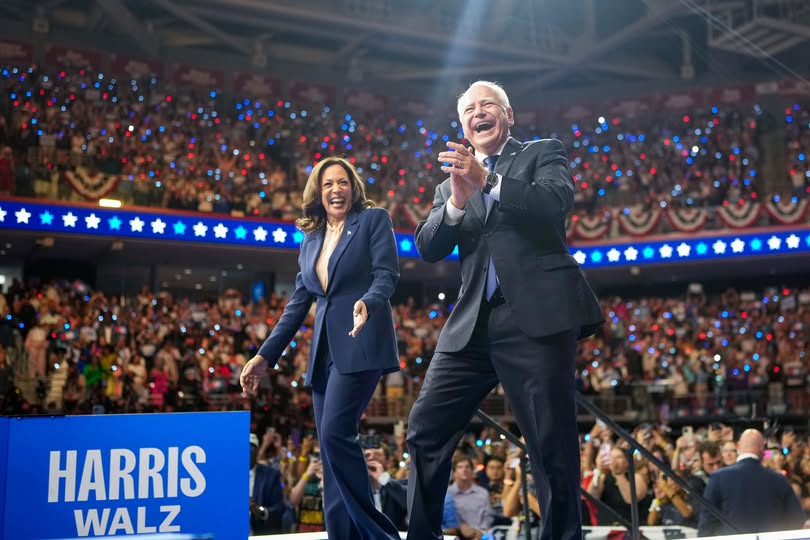
Former vice president Kamala D. Harris said in an interview that she “possibly” will run for president, adding an early twist to what is already likely to be a hard-fought and complicated race for the 2028 Democratic presidential nomination.
Speaking to the BBC for a segment that will air Sunday, Harris said she has not yet decided whether to seek the White House for a third time.
But when she was asked if her nieces would see a woman president, Harris said, “In their lifetime, for sure,” and then asked if it might be her, she added, “Possibly.”
“I am not done,” Harris said in the interview, part of a tour she is conducting in conjunction with the publication of her book, “107 Days,” about her lightning-fast campaign for the presidency last year after President Joe Biden ended his reelection campaign.
“I have lived my entire career a life of service, and it’s in my bones … There are many ways to serve. I have not decided yet what I will do in the future beyond what I am doing right now.”
Harris appeared to bristle when the interviewer, BBC’s Laura Kuenssberg, suggested that Harris has not performed well in early polls for the 2028 Democratic primary race.
“I think there are all kinds of polls that will tell you a variety of things,” the former vice president said. “I never listen to polls. If I had listened to polls, I never would have run for my first office or my second office, and I certainly wouldn’t be sitting here in this interview.”
While many Democrats insist they will not focus on the 2028 race until after next year’s congressional elections, party leaders are privately engaged in intense conversations over what kind of image and message they should present to voters after last year’s devastating second loss to Donald Trump.
Among those considered potential candidates are several prominent governors, including California’s Gavin Newsom, Illinois’ JB Pritzker, Pennsylvania’s Josh Shapiro, Maryland’s Wes Moore and Kentucky’s Andy Beshear. Other figures – including former Chicago mayor Rahm Emanuel, former Transportation secretary Pete Buttigieg, Sen. Cory Booker of New Jersey and Rep. Ro Khanna of California – are also said to be considering running.
The race promises to be a fight between a variety of figures with vastly different ideas on how the Democratic Party can recover from the Trump era. It will feature an unusually blunt debate over what the party should be in the years to come, given the broad rejection of the Democrats by large majorities of rural voters and those without college degrees. In the meantime, the party has been slow to complete a thorough autopsy of what went wrong in 2024.
Against that backdrop, Harris presents a complex figure for Democrats. She is appreciated by many in the party as the first woman to serve as vice president, and the first Black and Asian American person to fill that role.
When Biden abruptly ended his reelection effort in July of last year, Harris picked up the mantle and ran what many Democrats believe was an impressive campaign under very difficult circumstances.
Many in the party are eager to look forward and shed any ties with the Biden era, and Harris is a reminder of a presidency that ended with voters deeply concerned about Biden’s age and abilities. Harris’s book is in part an effort to deal with that reality.
The former vice president wrote that it was “recklessness” to leave Biden to decide, along with first lady Jill Biden, whether he should have sought reelection at age 80.
She acknowledged that she “perhaps” should have weighed in, but she said she worried it would have looked “incredibly self-serving” and disloyal for her to do.
“The stakes were simply too high,” Harris wrote in her book. “This wasn’t a choice that should have been left to an individual’s ego, an individual’s ambition. It should have been more than a personal decision.”
Harris’s 2020 campaign for president was a notable failure, as she was forced to withdraw early in the primary season, only to be chosen as Biden’s running mate once he won the nomination.
Her loss last year was traumatic for many Democrats, who viewed Trump as an existential threat to American democracy. The Democratic National Committee this year has been paying down millions in debt that the Harris campaign amassed during her run.
Although Harris says she has yet to make a decision about a 2028 run, she has taken steps that make such a candidacy possible.
In July, she said that she would not run for governor of California, passing up a race where she would have had a strong chance of victory and pointedly leaving open the door for a White House run.
“I look forward to getting back out and listening to the American people, helping elect Democrats across the nation who will fight fearlessly, and sharing more details in the months ahead about my own plans,” she said at the time.
Harris’s book has given her the opportunity to not only to clarify her role in Biden’s initial decision to seek reelection, but also to take shots at potential 2028 rivals, including Shapiro and Buttigieg, both of whom she considered as potential running mates last year before settling on Minnesota Gov. Tim Walz.



